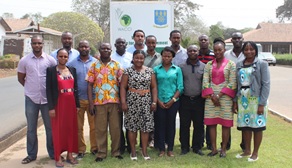PhD Training
Request for Applications: To Host PhD Programs Financed by the Regional Scholarship and Innovation Fund
The Partnership for skills in Applied Sciences, Engineering and Technology (PASET)
Request for Applications: To Host PhD Programs Financed by the Regional Scholarship and Innovation Fund
Released: June 27, 2016
The Partnership for skills in Applied Sciences, Engineering and Technology is an Africa-led initiative with the objective of strengthening the science, technology and engineering capability in sub-Saharan Africa to further its socio-economic transformation. The PASET Regional Scholarship and Innovation Fund (RSIF)[1] will contribute towards training 10,000 PhD students in the fields of Applied Sciences, Engineering and Technology (ASET) for priority sectors in 10 years, and building the capacity of PhD programs in a core of African universities. The first round RSIF will be implemented through competitively selected Africa Centers of Excellence (ACE), which have the capacity to offer PhD programs in the selected thematic areas. PASET is aligned with the ACE project objective of supporting higher education institutions to deliver quality post-graduate education programs and build research capacity in priority areas. The scholarship will be open to all but priority will be given to faculty members and students will be selected by PASET host institutions. The RSIF is being seeded by contributions from the Governments of Senegal, Rwanda and Ethiopia who have taken the lead in establishing the RSIF.
Africa-led initiative with the objective of strengthening the science, technology and engineering capability in sub-Saharan Africa to further its socio-economic transformation. The PASET Regional Scholarship and Innovation Fund (RSIF)[1] will contribute towards training 10,000 PhD students in the fields of Applied Sciences, Engineering and Technology (ASET) for priority sectors in 10 years, and building the capacity of PhD programs in a core of African universities. The first round RSIF will be implemented through competitively selected Africa Centers of Excellence (ACE), which have the capacity to offer PhD programs in the selected thematic areas. PASET is aligned with the ACE project objective of supporting higher education institutions to deliver quality post-graduate education programs and build research capacity in priority areas. The scholarship will be open to all but priority will be given to faculty members and students will be selected by PASET host institutions. The RSIF is being seeded by contributions from the Governments of Senegal, Rwanda and Ethiopia who have taken the lead in establishing the RSIF.
Regional Scholarship Innovation Fund [RSIF]
RSIF will eventually operate with three-grant windows: PhD training, research, and innovation. This application is related to PhD training only with the first batch of scholars expected to enroll in January 2017. The program will start on a limited scale in the first year and expand in the coming years.as more countries join and start contributing to PASET. Eighty percent of the first round of scholarships will be reserved for students from the current funding countries, Ethiopia, Rwanda and Senegal, with twenty percent of scholarships open to students from other sub-Saharan African countries. Due to lack of qualified faculty in many SSA universities, preference in scholarship awards will be given to current faculty members who do not hold PhD. Female candidates will be encouraged to apply and will receive preference if they meet other eligibility criteria.
Eligibility
The World Bank financed Africa Centers of Excellence (both under Phase I in West and Central Africa and under Phase II in Eastern and Southern Africa) are eligible to submit Applications to host PhD students in the thematic areas noted below. Every ACE applicant must have at least one PhD degree program in one of the thematic areas described below and which is offered by the World Bank financed ACE directly. PhD programs offered at a partner or affiliated institution, or even within the same university/ institution but outside of the ACE, will not be eligible. Non-ACE institutions, even if they work in the thematic areas below will not be considered for the first round of host institutions. In future calls, the eligibility is expected to be expanded to non-ACE hosting institutions.
Econet Foundation awards USD 600,000 for PhD Plant Breeding Scholarships
 The Econet Foundation has awarded a USD 600,000 grant to the West Africa Centre for Crop Improvement (WACCI) for the training of 10 PhD students who recently enrolled in the flagship PhD programme in Plant Breeding at the University of Ghana. The students, who are from nine countries in West, East and Southern Africa, will be equipped with knowledge and skills in modern plant breeding to work towards transforming agriculture in their countries.
The Econet Foundation has awarded a USD 600,000 grant to the West Africa Centre for Crop Improvement (WACCI) for the training of 10 PhD students who recently enrolled in the flagship PhD programme in Plant Breeding at the University of Ghana. The students, who are from nine countries in West, East and Southern Africa, will be equipped with knowledge and skills in modern plant breeding to work towards transforming agriculture in their countries.
WACCI began as a 10-year project with initial funding from the Alliance for a Green revolution in Africa (AGRA) to admit seven cohorts of students to undertake the innovative four-year programme in plant breeding. To date, AGRA has fully funded the training of 53 PhD students, in addition to providing core funding for running the Centre.
In order to sustain the programme beyond the AGRA-funded phase, WACCI competed for, and won, the World Bank Africa Centres of Excellence (ACE) grant of USD 8 million to develop WACCI into a sustainable Centre of Excellence. This called for maintaining PhD enrollment at a minimum of 15 students per cohort for the period 2014 to 2018. Through the generosity of the DAAD-Germany and other projects, WACCI enrolled 15 PhD students in 2015. In January 2016, WACCI enrolled 16 students through grants from the Econet Foundation and the DAAD.
This Econet Foundation grant was made possible following the visit of the Governing Board of AGRA to WACCI in April 2015, which left a positive impression with the Board Chair of AGRA, Mr. Strive Masiyiwa, CEO of Econet.
The Director of WACCI, Prof. Eric Yirenkyi Danquah stated: “I am excited about this development because Mr. Strive Masiyiwa is one of the most influential Africans of our times. It is a tremendous motivating force for us, to see him endorse the WACCI programme by funding it. Our plant breeders will be game-changers and history makers on the agricultural front in many countries in Africa and Mr. Masiyiwa’s dream for Africa – A food secure Africa- and my dream as well will become a reality in our lifetime.”
About WACCI
 The West Africa Centre for Crop Improvement (WACCI) was established in 2007 as a partnership between the University of Ghana and Cornell University with initial funding from the Alliance for a Green Revolution in Africa (AGRA) to train plant breeders, at the PhD level, with expertise to improve the indigenous crops that feed the people of the sub-region. Since inception, the Centre has enrolled 98 PhD students from 15 African countries and graduated 28 students from three cohorts. The Centre has also attracted over USD 26 million from multiple donors for the training of the next generation of Plant Breeders for Africa.
The West Africa Centre for Crop Improvement (WACCI) was established in 2007 as a partnership between the University of Ghana and Cornell University with initial funding from the Alliance for a Green Revolution in Africa (AGRA) to train plant breeders, at the PhD level, with expertise to improve the indigenous crops that feed the people of the sub-region. Since inception, the Centre has enrolled 98 PhD students from 15 African countries and graduated 28 students from three cohorts. The Centre has also attracted over USD 26 million from multiple donors for the training of the next generation of Plant Breeders for Africa.
About ECONET
 Econet is a privately held diversified telecommunications group with operations and investments in Africa, Europe, South America, North America and the East Asia Pacific Rim, offering products and services in the core areas of mobile and fixed telephony services, broadband, internet, satellite and fibre optic networks. The company also has investments beyond the traditional telecoms sector, which include financial services, insurance, e-commerce, renewable energy, education, Coca-Cola bottling, hospitality and payment gateway solutions. The Econet Foundation is at the centre of Econet’s network of corporate social responsibility programmes. The Foundation makes social investments by funding projects, which support people from disadvantaged communities. Agricultural Development is one of six focal areas of the Econet Foundation.
Econet is a privately held diversified telecommunications group with operations and investments in Africa, Europe, South America, North America and the East Asia Pacific Rim, offering products and services in the core areas of mobile and fixed telephony services, broadband, internet, satellite and fibre optic networks. The company also has investments beyond the traditional telecoms sector, which include financial services, insurance, e-commerce, renewable energy, education, Coca-Cola bottling, hospitality and payment gateway solutions. The Econet Foundation is at the centre of Econet’s network of corporate social responsibility programmes. The Foundation makes social investments by funding projects, which support people from disadvantaged communities. Agricultural Development is one of six focal areas of the Econet Foundation.